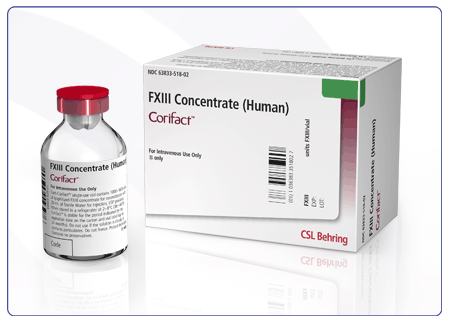CORIFACT–The First and Only Dual-Subunit FXIII Concentrate
Approved for patients with congenital FXIII deficiency, a rare inherited condition affecting both men and women.1
- CORIFACT is indicated for routine prophylactic treatment and perioperative management of surgical bleeding in adult and pediatric patients with congenital Factor XIII (FXIII) deficiency. CORIFACT must be administered intravenously.
- The only FXIII concentrate that contains both A- and B-subunits (dual-subunits)
- Protects against FXIII deficiency, regardless of subunit abnormality
- The B-subunits in plasma have no enzymatic activity and function as carrier molecules for A-subunits. They stabilize the structure of the A-subunits and protect them from proteolysis.

CORIFACT is the first and only dual-subunit FXIII concentrate for routine prophylactic treatment of congenital FXIII deficiency
- Effectively maintains FXIII levels
- Undergoes specific virus inactivation and removal steps, reducing the risk of exposure to infectious agents
- The risk of transmission of infectious agents cannot be completely eliminated.
- Safe and effective for prophylactic and perioperative use
- Offers convenient dosing, administration and storage
- Available as a lyophilized powder, CORIFACT is stored at 36 - 46°F for 36 months or up to 77° for 6 months.
- Has over 25 years of clinical experience as Fibrogammin® P outside the US
- Part of CSL Behring's commitment to people with rare diseases
Important Safety Information
CORIFACT®, FXIII Concentrate (Human), is indicated for routine prophylactic treatment and perioperative management of surgical bleeding in adult and pediatric patients with congenital Factor XIII deficiency. CORIFACT must be administered intravenously.
CORIFACT is contraindicated in individuals with known anaphylactic or severe systemic reactions to human plasma-derived products.
Hypersensitivity reactions may occur with CORIFACT. If there are signs of anaphylaxis or hypersensitivity reactions (including urticaria, rash, tightness of the chest, wheezing, and hypotension), immediately discontinue administration and institute appropriate treatment.
Inhibitory antibodies to FXIII have been detected in patients receiving CORIFACT. Monitor the patient’s trough FXIII activity level during treatment. If expected plasma FXIII activity levels are not attained or breakthrough bleeding occurs, perform an assay measuring FXIII inhibitory antibody concentrations.
Thromboembolic complications have been reported with CORIFACT; monitor patients with known risk factors for thrombotic events.
CORIFACT is derived from human blood. The risk of transmission of infectious agents, including viruses and, theoretically, the Creutzfeldt-Jakob disease (CJD) agent and its variant (vCJD), cannot be completely eliminated.
The most common adverse reactions reported in clinical trials (frequency >1%) following treatment with CORIFACT were joint inflammation, hypersensitivity, rash, pruritus; hematoma, arthralgia, headache, elevated thrombin-anti-thrombin levels, and increased blood lactate dehydrogenase. Serious adverse reactions included hypersensitivity, acute ischemia, and neutralizing antibodies against FXIII.
Please see full prescribing information for CORIFACT.
To report SUSPECTED ADVERSE REACTIONS, contact the CSL Behring Pharmacovigilance Department at 1-866-915-6958 or FDA at 1-800-FDA-1088 or
www.fda.gov/medwatch.